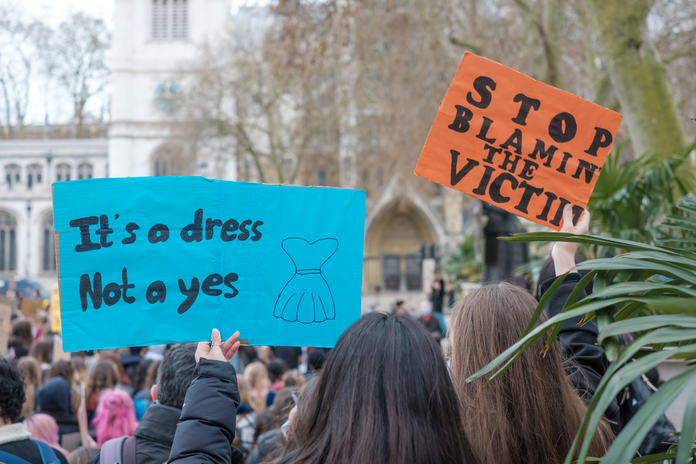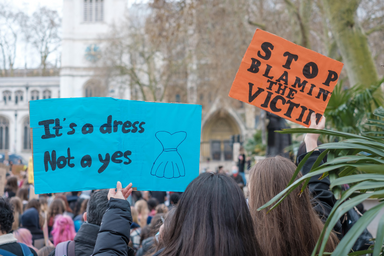Over the past few weeks, Everyone’s Invited has allowed thousands of young people to come together and share their experiences of rape culture online. Thousands have found a platform through which to voice the issues that schools have failed to include in conversation. The sudden explosion of their stories comes goes to show the absence of a working justice system and, as a result, the lack of faith victims of sexual abuse and harassment have in the institutions which claim – and fail – to protect them. That Everyone’s Invited has been able to shed light on years of rape culture begs the questions; why has it been ignored for so long?
sites like Everyone’s Invited and Say It Loud are creating safe spaces for people’s stories to be heard.
The site was created in June 2020, when founder Soma Sara shared her personal experience of rape culture to social media. After receiving a chorus of stories that confirmed the shocking reality of misogyny, harassment and abuse existing across the UK, Soma created the webpage and, a little under a year later, the campaign features more than 4,000 anonymous testimonies. Everyone’s Invited has brought to the surface something that will not go back down – that we live in a world in which sexual harassment and abuse goes unheard; where justice is not served for the people whose lives are devastated.
Testimonies come from both young men and women, but the vast majority are from girls and young women. Women have spoken out against a private school in central London and a group of year 13 boys who are well known to collect naked images of girls and circulate them around schools. The fact that this is a known and frequently voiced problem shows the extent to which such abusive behaviour has been normalised. At this school, and, sadly, like many others, this behaviour is brushed under the carpet, leaving victims feeling unable to come forward and ask for support.
The site has made it abundantly clear that sexual harassment and abuse is a huge problem at our private schools, and yet the issue cannot be confined to one place. As Soma says, ‘if we start pointing fingers at certain demographics or singling out individuals or institutions, we risk making these cases seem like anomalies, when really this problem is pervasive … it exists everywhere.’ It would be too simple to isolate the existence of rape culture in private schools alone. There is much more hard work to be done and, indeed, the problem comes much closer to home than people may be comfortable to admit. Many accounts can be found that directly relate to the University of Bristol. A shocking number of such reports relate to experiences of harassment which occurred during fresher’s week, a time where there is real pressure to make friends, to have ‘fun.’ It’s a period which asks young people to rely on near strangers for support and put their faith in those they have only just met. Sadly, for many young women, this faith gets abused. What’s worse, the experiences which occur when we are drunk or unable to consent lead many of us to believe we cannot report the truth, for fear we ourselves will be blamed.
What Everyone’s Invited has made clear is that sexual harassment and abuse is a massive social problem, one which threatens all of us. The fear throughout our young people that they will be turned on or accused for merely sharing their truths is the disgusting reality of the world we live in. In such a climate, perpetrators are allowed the power to abuse and harass with no likelihood of punishment. According to Rape Crisis England & Wales, in 2017 20% of women and 4% of men had experienced some type of sexual assault since the age of 16, equivalent to 3.4 million female and 631,000 male victims. Yet, conviction rates for rape are far lower than other crimes, with only 5.7% of reported rape cases ending in a conviction for the perpetrator. In order to truly face rape culture and begin the work necessary to demolish it, we must come together as a community and rebuild from the ground up. Everyone has a part to play in making young women feel safe, beginning with act of listening and taking their words as truth.
Even though today we are still pressured to be perfect, society has come a long way. It makes me wonder whether we are entering a new age of body positivity and acceptance where beauty standards are no longer important. Many companies, like Dove, are promoting body positivity movements and letting women know that every single body is beautiful. Even mainstream artists and influencers such as Lizzo are using their platforms to spread a worldwide message of love and positivity surrounding the subject. Happiness and self-confidence are key and can help women strive for their goals. The beauty standards have changed, evolved, and even improved, but we still have a long way to go. So, be your best self and don’t let anyone else’s standards define who you are.



